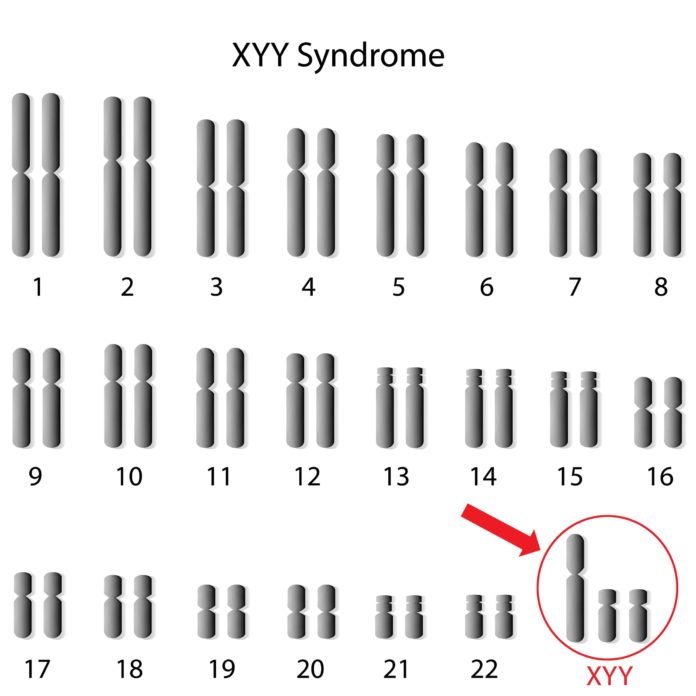XYY syndrome is a rare genetic condition that occurs in males, only when they are born with an additional Y chromosome in most or all of their cells. This means that instead of one X chromosome and Y chromosome, there are two Y chromosomes and one X chromosome. Sex chromosome abnormalities like XYY syndrome occurs in 1 out of 1000 boys. Most people who have XYY syndrome lead productive lives with normal sexual development and fertility.
What are the symptoms of XYY syndrome?
The symptoms of XYY syndrome can vary. Newborns with this syndrome do not show any noticeable physical characteristics. However, as they grow up, the following physical symptoms may be visible:
- Taller height
- Weak muscles (hypotonia)
- Hand tremors
- Increased belly fat
- Asthma
- Poor motor skills
- Spaced eyes
- Large teeth
- Large head
- Flat feet
- Clinodactyly (curved pinky finger)
Since the symptoms mentioned above are commonly found in males, XYY syndrome goes undiagnosed most of the time. Some developmental symptoms of XYY syndrome include:
- Difficulty in processing spoken words
- Coordination problems
- Behavioral problems
- Anxiety
- Depression
- Attention deficit hyperactivity disorder (ADHD)
- Autism
What causes XYY syndrome?
The XYY syndrome is caused due to a random error in the cell division. There are 46 chromosomes divided into 23 pairs in each person, including two sex chromosomes that help determine whether the person will develop male or female characteristics. Half of the chromosomes are inherited from the mother and the other half from the father.
These chromosomes contain genes that determine an individual’s physical characteristics such as eye color, height, hair color, etc. The error in cell division occurs either before conception or during the embryo’s development. When the extra chromosome results from an error in the cell division during the embryo’s development, the boy may have a mosaic form of XYY syndrome. This means that only some cells have extra Y chromosomes, leading to fewer symptoms of XYY syndrome.
How is this condition diagnosed?
As most people with XYY syndrome do not have any obvious symptoms, the diagnosis is rare. However, it can be diagnosed before the child’s birth, while still in the mother’s womb, through amniocentesis. This procedure takes out a small amount of amniotic fluid that surrounds the fetus for testing. Chorionic Villus Sampling (CVS) is also used to detect abnormalities in an unborn child during pregnancy and can be used to detect an extra Y chromosome if present.
A physician can also diagnose XYY syndrome through clinical evaluation, patient history, and tests like karyotype (chromosomal analysis) or non-invasive prenatal testing (NIPT) that is used to detect the extra Y chromosome. Post-birth, administering a karyotype or a microarray test on the baby can be used to diagnose XYY syndrome.
Other symptoms such as hurdles with the learning ability, developmental delays, and other behavioral problems can also help diagnose the syndrome.
Are there any complications involved?
XYY syndrome may increase the risks of the following health conditions:
What is the treatment for XYY syndrome?
XYY syndrome is a lifelong condition that has no treatment. However, most people with this syndrome live normal lives and seek help for specific problems such as behavioral changes and learning delays or difficulties through therapies. Medication and therapies may help improve the symptoms of XYY syndrome and reduce complications. Early treatments have proved effective for XYY syndrome, and treatment options can include:
- Doctor visits: This helps monitor and treat any delays in development, language difficulties, and other health problems.
- Counselling: It is essential for parents and the patient to understand the condition to provide the right care and live a productive life.
- Therapy: Specific problems such as difficulties with speech, behavior, etc., can be treated through therapies. These problems must be treated in the initial stages or as soon as these concerns are visible for better outcomes from the therapy. Speech therapy helps in improving speech and motor skills. Physical or occupational therapies help with muscle strength and motor skill development. Educational therapy is also applied for improving the learning capabilities of the child.
It is common for boys with XYY syndrome to develop speech problems, learning, and possessing social challenges. This can, in turn, affect their confidence and self-esteem, and lead to several problems in schools. Counselling and therapy, along with regular doctor visits, could help monitor the behavior of children and treat any physical and mental problems, such as ADHD, depression, and social interaction issues.
Prevention
Prevention of XYY syndrome is not possible as it is a genetic condition and is caused randomly. However, with the right medical care and early intervention, boys with XYY syndrome can normally live a productive life, even with physical differences.


















